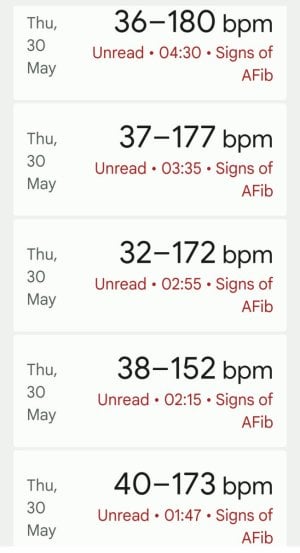How a Simple Smart Watch Notification Turned Into a Life-Saving Miracle on Vacation
By
- Replies 5
In the golden years of our lives, we often look forward to leisurely vacations and the chance to explore new places without the hustle and bustle of work life. For Sydney local David Heidtman, a trip to the breathtaking Kimberley region in Western Australia was supposed to be a memorable getaway. Little did he know his smartwatch would turn his holiday into a life-saving event.
David, at the age of 76, was soaking in the beauty of the Kimberley when his wrist buzzed with a notification that would change his life. His smartwatch alerted him to an irregular heart rate, a sign that many might dismiss as a minor glitch or a result of physical exertion. David initially thought he might have caught the flu or a virus, a common enough occurrence for travellers.
Upon returning home, however, the persistent notification prompted him to consult a cardiologist. The diagnosis was unexpected and serious: atrial fibrillation (AF), a condition characterised by an irregular and often rapid heart rate that can lead to blood clots, stroke, and other heart-related complications. In Australia, AF affects an estimated half a million people and is the second-most expensive cardiovascular disease, costing the healthcare system and individuals alike.
The cardiologist's words struck a chord with David. 'It's not so much the AF as much as how it puts you at a higher risk of other life-threatening conditions such as blood clots and stroke,' he was told. This revelation led David to undergo a series of treatments, including electroshock therapy, which significantly improved his condition.
But David didn't stop there. To further mitigate the risks associated with AF, he underwent a cardiac ablation in January 2024, a procedure that aims to correct heart rhythm problems. Now, David is not only managing his condition but thriving. 'Life's been terrific,' he says, crediting his smartwatch for its role in monitoring his heart health and alerting him to irregularities.
David's story is a testament to the importance of being attuned to our bodies and the potential of modern technology to aid in health management. Experts are now advocating for greater awareness of AF, which they consider a 'major public health issue.' With an estimated $1.4 billion spent on AF in 2020-2021 and about 5.4 per cent of Australians diagnosed with the condition, it's clear that more research and education are needed.
Associate Professor Chrishan Nalliah from MQ Health Cardiology emphasises the need for advancements in genetic and molecular research, as well as breakthroughs in device and lead technologies. However, she also highlights the significant impact wearable devices like smartwatches and fitness trackers have had on heart health management. These gadgets are not just for counting steps or monitoring sleep; they can be crucial in identifying heart rhythm abnormalities and other health parameters, leading to early diagnosis and better management of conditions like AF.
For our members and readers, David's experience is a powerful reminder to pay attention to the signals our bodies send us, no matter how subtle they may seem. Suppose you experience symptoms such as a rapid heartbeat, palpitations, dizziness, unexplained tiredness, shortness of breath, fainting, swelling of the ankles, or chest pain. In that case, it's crucial to consult with your GP for a heart check.
 In the age of technology, let's embrace the tools that can keep us healthy and safe. Who knows, the watch on your wrist might just be your guardian angel in disguise. Have you had a similar experience with a smartwatch or fitness tracker? Share your stories with us in the comments below – your insights could be a beacon of hope for someone else.
In the age of technology, let's embrace the tools that can keep us healthy and safe. Who knows, the watch on your wrist might just be your guardian angel in disguise. Have you had a similar experience with a smartwatch or fitness tracker? Share your stories with us in the comments below – your insights could be a beacon of hope for someone else.
David, at the age of 76, was soaking in the beauty of the Kimberley when his wrist buzzed with a notification that would change his life. His smartwatch alerted him to an irregular heart rate, a sign that many might dismiss as a minor glitch or a result of physical exertion. David initially thought he might have caught the flu or a virus, a common enough occurrence for travellers.
Upon returning home, however, the persistent notification prompted him to consult a cardiologist. The diagnosis was unexpected and serious: atrial fibrillation (AF), a condition characterised by an irregular and often rapid heart rate that can lead to blood clots, stroke, and other heart-related complications. In Australia, AF affects an estimated half a million people and is the second-most expensive cardiovascular disease, costing the healthcare system and individuals alike.
The cardiologist's words struck a chord with David. 'It's not so much the AF as much as how it puts you at a higher risk of other life-threatening conditions such as blood clots and stroke,' he was told. This revelation led David to undergo a series of treatments, including electroshock therapy, which significantly improved his condition.
But David didn't stop there. To further mitigate the risks associated with AF, he underwent a cardiac ablation in January 2024, a procedure that aims to correct heart rhythm problems. Now, David is not only managing his condition but thriving. 'Life's been terrific,' he says, crediting his smartwatch for its role in monitoring his heart health and alerting him to irregularities.
David's story is a testament to the importance of being attuned to our bodies and the potential of modern technology to aid in health management. Experts are now advocating for greater awareness of AF, which they consider a 'major public health issue.' With an estimated $1.4 billion spent on AF in 2020-2021 and about 5.4 per cent of Australians diagnosed with the condition, it's clear that more research and education are needed.
Associate Professor Chrishan Nalliah from MQ Health Cardiology emphasises the need for advancements in genetic and molecular research, as well as breakthroughs in device and lead technologies. However, she also highlights the significant impact wearable devices like smartwatches and fitness trackers have had on heart health management. These gadgets are not just for counting steps or monitoring sleep; they can be crucial in identifying heart rhythm abnormalities and other health parameters, leading to early diagnosis and better management of conditions like AF.
For our members and readers, David's experience is a powerful reminder to pay attention to the signals our bodies send us, no matter how subtle they may seem. Suppose you experience symptoms such as a rapid heartbeat, palpitations, dizziness, unexplained tiredness, shortness of breath, fainting, swelling of the ankles, or chest pain. In that case, it's crucial to consult with your GP for a heart check.
Key Takeaways
- David Heidtman received a life-saving notification about an irregular heart rate on his smartwatch while on holiday in WA's Kimberley region.
- After being advised to see a cardiologist upon his return home, the Sydney resident was diagnosed with atrial fibrillation (AF), which increases the risk of stroke and other life-threatening conditions.
- Heidtman underwent treatments, including electroshock therapy and cardiac ablation, to manage his AF and has since felt significantly better, continuing to monitor his condition with his smartwatch.
- Experts are advocating for greater public awareness and research into AF, highlighting the role of wearable devices like smartwatches in managing heart health and identifying potential heart rhythm abnormalities.









